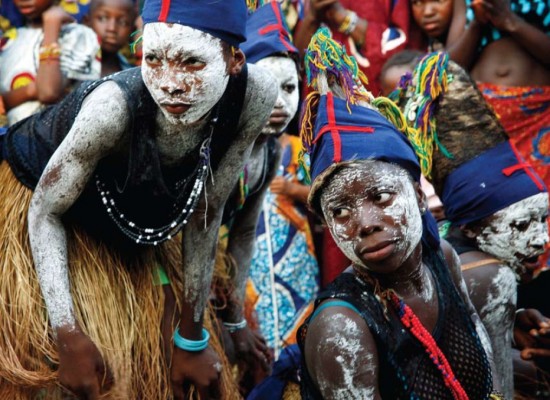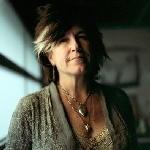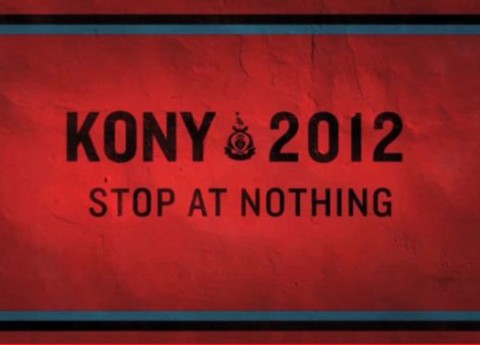Dancers from the village of Kongonanie in Sierra Leone wait to participate in a welcome ceremony prior to the bonfire that will take place that night, as part of Fambul Tok’s grass-roots reconciliation program. (Photo copyright Sara Terry, courtesy of Catalyst for Peace.)Of Fambul Tok and Kony 2012:
How We Tell Stories Is Critical
It’s great that more people know who Joseph Kony is--but if we’re learning about him through a lens that reinforces Western stereotypes (and misrepresents and diminishes Africans and their capacities and cultural wisdom), then the learning brings with it a huge negative.
By Sara Terry
[Sara Terry, producer/director of Fambul Tok, wrote this blog on March 8 for the On Screen/In Person tour organized by Mid-Atlantic Center for the Arts. Fambul Tok is a featured film on that tour. As the blog deals with the philosophical origins of Fambul Tok, we are publishing it as it appeared on March 8.)
Sara Terry
First off, I need to say that I think it’s a really good idea for as many people as possible to know who Joseph Kony is--the leader of the Lord’s Resistance Army (LRA), which for more than two decades waged a brutal war in northern Uganda, that went virtually uncovered by the Western media for most of that time. At the same time, it’s worth noting that the LRA hasn’t operated in Uganda since 2006, and is now considered to be barely hanging on, in the Democratic Republic of Congo.
Kony has become quite the household name over the past few days--especially among middle schoolers--thanks to a 28-minute documentary by Invisible Children and their “Stop Kony 2012” campaign. It’s exploded as a viral phenomenon on the Internet (with more than 70 million views)– and so has a storm of critiques, both of the film and the organization behind it.
We talked about it a little at last night’s screening of Fambul Tok and I hope it comes up again tonight and tomorrow night, the last screenings of my OSIP tour.
Because I want to talk about not just raising awareness--but HOW that awareness gets raised. The Kony 2012 doc has been widely criticized (and rightly so, from my perspective) for perpetuating the myth that the West/”the white man” needs to save Africa from all its problems. It’s great that more people know who Joseph Kony is--but if we’re learning about him through a lens that reinforces Western stereotypes (and misrepresents and diminishes Africans and their capacities and cultural wisdom), then the learning brings with it a huge negative. We have to question the storytellers--and the ways we tell stories--as much as we question everything else. The very way we frame stories, the perspective we bring, the questions we ask, the way we let others speak for themselves (or not) is an absolutely critical part of this dialogue.
I think the West has done more than enough “talking” for Africa, judging Africa by Western standards of crime and punishment that have little to do with local traditions of justice through reconciliation. And for me, that includes the Kony 2012 campaign, particularly because it advocates what most Ugandans do NOT want: military intervention by the US, and a trial at the International Criminal Court for KonyIt’s something my collaborator Libby Hoffman pointed out when we first began working together on a still photography project about forgiveness traditions in post-conflict African countries, a collaboration that ultimately led to us meeting John Caulker, the founder of Fambul Tok, and to the creation of the Fambul Tok documentary. As a peacebuilder, Libby was, and is, very convinced that the way you see something, the lens you bring to a story based on your own perceptions and filters, is as important as what is seen. In other words, like the law of quantum physics, the storyteller directly impacts the story being told. It was a sobering thought for me, as a longtime journalist, and gave me much to aspire to. Early on in our work, in 2007, Libby shared this quote from the Nigerian Booker Award-winning author Ben Okri--words which became our shared inspiration as we learned the story of Fambul Tok, and brought it to others through our documentary:
“We have to re-discover Africa. The first discovery of Africa by Europe was the wrong one. It was not a discovery. It was an act of misperception. They saw, and bequeathed to future ages, an Africa based on what they thought of as important. They did not see Africa. And this wrong seeing of Africa is part of the problems of today. Africa was seen from a point of view of greed, of what could be got from it. And what you see is what you make. What you see in a people is what you eventually create in them. It is now time for a new seeing. It is now time to clear the darkness from the eyes of the Western world. The world should now begin to see the light in Africa, to see its sunlight, to see its brightness, its brilliance, its beauty. If we see it, it will be revealed. We only see what we see. Only what we see, what we see anew, is revealed to us. Africa has been waiting, for centuries, to be discovered with eyes of love, the eyes of a lover. There is no true seeing without love.”
I think the West has done more than enough “talking” for Africa, judging Africa by Western standards of crime and punishment that have little to do with local traditions of justice through reconciliation. And for me, that includes the Kony 2012 campaign, particularly because it advocates what most Ugandans do NOT want: military intervention by the US, and a trial at the International Criminal Court for Kony. In answering criticisms of their campaign on their website, the founders of Invisible Children said this:
“We are advocating for the arrest of Joseph Kony so that he can be tried by the International Criminal Court (ICC) as a precedent for future war criminals. The goal of KONY 2012 is for the world to unite to see Kony arrested and prosecuted for his crimes against humanity.”
It’s a popular concept in the West--that we will prosecute African warlords and prove to Africa and the rest of the world that war crimes are not okay. Unfortunately, that conversation rings hollow to so many people in Africa--who criticize the West for not indicting Western leaders considered, in the eyes of many, to be responsible for war crimes as defined by international law (Henry Kissinger is a popular example for many; George W. Bush is a more recent candidate). And many African human rights activists--including John Caulker--argue that the West would do well do listen to Africans, who have a lot to say about the role that local traditions and culture can and should play in resolving post-conflict dilemmas.
Just watch Fambul Tok--you’ll see what John is talking about, and the amazing impact of a cultural tradition in addressing truth-telling, forgiveness and reconciliation at the grass-roots level.
On the Internet, a few of the posts from people who are outraged that anyone would criticize Invisible Children suggest that other activists (and storytellers) are simply jealous that their work has not had the same impact. I’m not jealous. But I will tell you this: I wish 70 million people would watch Fambul Tok, and realize how much the West has to learn from Africa. Maybe then we might begin to start seeing Africa in the new ways that Ben Okri so eloquently urges us upon us all.
I’d like to leave you with three of the most recent links that have come my way, one from a Westerner who has worked on the ground in northern Uganda for years, one is a posting from the Fambul Tok website and Libby Hoffman that pulls together many of the best critiques of Kony 2012 and Invisible Children, and one from a site that pulls together responses from the people we should all be listening to in all of this--Africans.
http://www.fambultokblog.org/in-the-news/responses-to-the-kony2012-campaign
http://boingboing.net/2012/03/08/african-voices-respond-to-hype.html#previouspost
Founder/Publisher/Editor: David McGee
Contributing Editors: Billy Altman, Laura Fissinger, Christopher Hill, Derk Richardson
Logo Design: John Mendelsohn (www.johnmendelsohn.com)
Website Design: Kieran McGee (www.kieranmcgee.com)
Staff Photographers: Audrey Harrod (Louisville, KY; www.flickr.com/audreyharrod), Alicia Zappier (New York)
E-mail: thebluegrassspecial@gmail.com
Mailing Address: David McGee, 201 W. 85 St.—5B, New York, NY 10024





